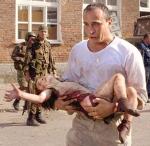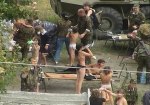Islamic Forces: The Move Away from Independent Chechnya, Towards Islamic State
Succeeding the First Chechen war of 1994, the Russian government portrayed the first war as one against bandits and Islamic fundamentalists, but as a result of the September 11 attacks the label has changed, and now most, if not all Chechens are referred to as terrorists. The attacks of September 11 2001 introduced a new paradigm into world politics, and Chechnya has since been one of the most affected regions by the increased focus on terrorism. Like any religion, Islam claims to be the source of absolute truth, and in Chechnya, religious motivation has stimulated and guided political ambitions for a prolonged period of time.
Former mentioned historians of Russian diplomatic history, Trenin and Malashenko, demonstrate that the vigorous growing Islamic threat in Chechnya “became a justification for fighting the war until ultimately victorious, and for maintaing the toughest stance possible in order to prevent religious extremism from spilling over Chechen borders.” (Trenin & Malashenko:2004:73). The modern Islamic forces have changed the nature of the conflict in Chechnya in modern times, as the Islamists claim that their actions are sanctioned by a higher authority, and therefore they have the right to use any and all methods, including hostage taking and kidnapping, necessary to achieve their ends –– often exceeding the moral limits of Western societies. Swedish Scholar, Svante Cornell, who specialises in security issues within Eurasia supports Trenin and Malashenko, and states; “Under the banner of Islamic extremitism, modern day Chechen rebels have revised the focus of their insurgent attacks, and use often brutal actions which they deem necessary to achieve their autonomous Islamic region.” (Cornell:2003: Online). Although Islam is certainly not the root origin of the conflict, it is a major factor in its main ideological tenet and its continuation. (Trenin & Malashenko:2004:73)
Events such as the Beslan Massacre of 2004 have essentially become a justification for continuing Russia’s ‘War on Terror’. In the first week of September 2004, over 340 people, children, teachers and parents who were present on the opening day of school were killed after the siege of School No. 1 in Beslan. The siege ended in a blood stained battle between the hostage takers and the Russian security forces. According to R. Gidadhubli, contributing author of Economic and Political weekly, there are several causes which contributed to the Beslan siege. The Russian authorities have contended that this was a terrorist act supported by international terrorist leaders. As claimed by the Russian officials, a major cause for the school siege has been that the Chechen rebel leaders developed a strategy to exploit the ethnic tensions within the North Caucasus. (Gidadhubli:2004) The North Caucasian Republics to this day still suffer from poor-economic conditions in terms of high infant mortality, mass unemployment and low levels of education. “This seems to have provided fertile ground for the prevailing discontent among the people, which has been exploited by terrorist elements who are active in the region.” (Gidadhubli:2004:4705).
Beslan Massacre Images
- Tribute to those killed
- Children Running as Shots were fired
- Insight into the Gymnasium
- The victims carried out
- First Aid Station
Currently, radical Islamists from Chechnya (as well as other North Caucasian Republics) have been held responsible for a number of terrorist attacks all throughout Russia; most notably the 2010 Moscow Metro bombings, the 2011 Domodevo International Airport bombing, and two Chechen brothers were held responsible for the 2013 Boston Bombings in the US. Although modern Chechen Islamic extremists have turned the focus of the conflict away from Chechen nationalism and its secession, the harrowing actions they assume necessary to fight for their campaign has unavoidably extended the continuous conflict.





